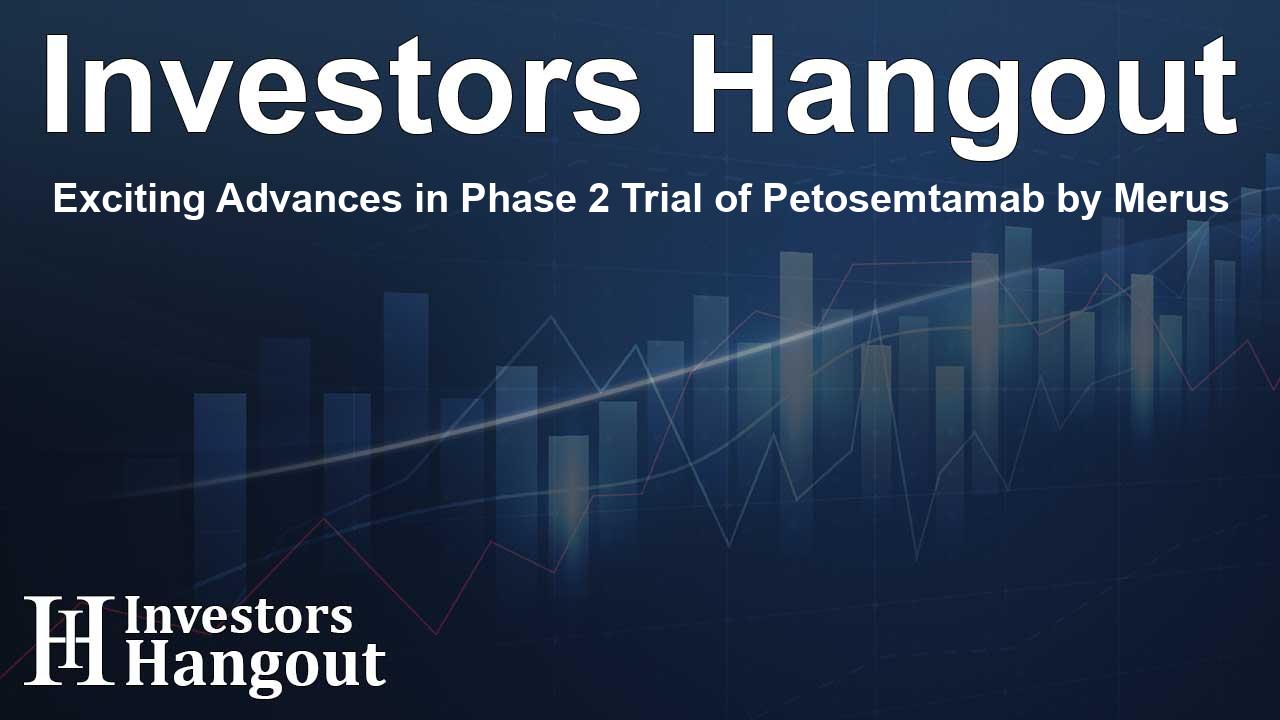Exciting Advances in Phase 2 Trial of Petosemtamab by Merus

Merus Announces Milestone in Phase 2 Trial for Petosemtamab
Merus N.V. (Nasdaq: MRUS), a pioneering company in oncology, has taken a significant step forward in cancer treatment. The announcement that the first patient has been dosed in their Phase 2 trial of petosemtamab is exciting news for both the company and the medical community. This trial focuses on utilizing petosemtamab as a monotherapy for patients with heavily pretreated metastatic colorectal cancer (mCRC). This innovative approach may offer new hope for patients struggling with this challenging condition.
The Phase 2 trial is designed as an open-label study to assess not only the safety of petosemtamab but also its antitumor activity in individuals with 3L+ mCRC, particularly those who have undergone previous anti-EGFR therapy. To qualify for this trial, patients must not have specific mutations detectable via ctDNA NGS, including KRAS and NRAS mutations. This careful selection process underlines the commitment of Merus to providing targeted and effective treatment options.
Understanding Petosemtamab
Petosemtamab, also referred to by its code MCLA-158, is a unique human full-length IgG1 antibody. It specifically targets the epidermal growth factor receptor (EGFR) and the leucine-rich repeat containing G-protein-coupled receptor 5 (LGR5). The design of this Biclonics® therapy incorporates three distinct mechanisms of action, which include the inhibition of EGFR-dependent signaling and LGR5 binding that facilitates EGFR internalization and degradation within cancer cells.
Additionally, petosemtamab exhibits enhanced antibody-dependent cell-mediated cytotoxicity (ADCC) and antibody-dependent cellular phagocytosis (ADCP) activity, making it a compelling candidate in the ongoing battle against colorectal cancer. These multifaceted actions not only make petosemtamab a special treatment approach but also enhance its potential effectiveness compared to existing therapies. John de Kruif, Ph.D., Chief Technology Officer at Merus, noted that in preclinical CRC studies, petosemtamab consistently outperformed cetuximab, a traditional treatment option.
The Journey Forward
Merus's commitment to research and innovation in oncology is evident in their development of this trial. The company is dedicated to advancing therapeutics that can improve outcomes for patients who have limited options, particularly in heavily pretreated populations. With their proprietary technologies, Merus aims to transform the landscape of cancer therapy.
As the trial progresses, stakeholders are optimistic about the data that will emerge regarding the safety and efficacy of petosemtamab. This is part of a broader strategy that the company has embarked upon to cultivate a pipeline of promising therapeutics that hold the potential to revolutionize the way cancer is treated.
About Merus N.V.
Merus N.V. is a clinical-stage oncology company that has made significant strides in developing innovative bispecific and trispecific antibody therapeutics. These therapeutics are known as Multiclonics®, and they are designed using cutting-edge technologies that ensure they exhibit characteristics similar to traditional human monoclonal antibodies, such as prolonged half-life and minimized immunogenicity. The company has been at the forefront of clinical advancements, and their research efforts continue to focus on discovering and delivering next-generation cancer treatments to patients across the globe.
For those interested in learning more about the innovative work being done at Merus, additional information can be found on their corporate website.
Frequently Asked Questions
What is petosemtamab and how does it work?
Petosemtamab is a Biclonics® antibody developed by Merus targeting EGFR and LGR5. It works by inhibiting EGFR signaling and enhancing immune responses against cancer cells.
How does the Phase 2 trial evaluate petosemtamab?
The trial assesses both the safety and antitumor effectiveness of petosemtamab in patients with heavily pretreated metastatic colorectal cancer.
What makes Merus unique in the field of oncology?
Merus focuses on developing full-length multispecific antibodies that leverage advanced technologies to improve cancer therapies, which are observed to have favorable properties similar to standard monoclonal antibodies.
Who is eligible to participate in the trial?
Patients with 3L+ mCRC without certain mutations detectable in their plasma are eligible for participation in the trial.
What are the future prospects for petosemtamab therapy?
As the trial progresses, positive outcomes could lead to new treatment options for patients with limited therapy choices, establishing a new paradigm in treating metastatic colorectal cancer.
About Investors Hangout
Investors Hangout is a leading online stock forum for financial discussion and learning, offering a wide range of free tools and resources. It draws in traders of all levels, who exchange market knowledge, investigate trading tactics, and keep an eye on industry developments in real time. Featuring financial articles, stock message boards, quotes, charts, company profiles, and live news updates. Through cooperative learning and a wealth of informational resources, it helps users from novices creating their first portfolios to experts honing their techniques. Join Investors Hangout today: https://investorshangout.com/
Disclaimer: The content of this article is solely for general informational purposes only; it does not represent legal, financial, or investment advice. Investors Hangout does not offer financial advice; the author is not a licensed financial advisor. Consult a qualified advisor before making any financial or investment decisions based on this article. The author's interpretation of publicly available data shapes the opinions presented here; as a result, they should not be taken as advice to purchase, sell, or hold any securities mentioned or any other investments. The author does not guarantee the accuracy, completeness, or timeliness of any material, providing it "as is." Information and market conditions may change; past performance is not indicative of future outcomes. If any of the material offered here is inaccurate, please contact us for corrections.